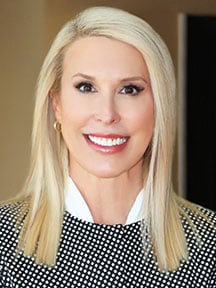
Wealth Management Is a Family Affair
 Melanie Schmieding, CTFA, Director of Baird Family Wealth
Melanie Schmieding, CTFA, Director of Baird Family Wealth
In How To Talk With Your Family About Wealth, we discussed the importance of the family conversation when it comes to planning a legacy – and how quickly wealth can be lost when these conversations don’t take place. Yet despite their importance, these discussions can still be difficult, especially if your family doesn’t regularly talk about money. We spoke with Melanie Schmieding, CTFA and Director of Baird Family Wealth, for advice on setting the stage and leading these conversations in a way that can be enriching for everyone.
Tip 1: Spell Out the Purpose of the Meeting
It’s common for family members to have built up individual reputations, roles and communication styles over the years – so much so that when someone suddenly “shifts lanes” by interacting differently with the rest of the family, it’s seen as a cause for concern. To avoid misinterpretation and undue confusion, be clear and upfront about the purpose of the meeting. One way to phrase your request might look like this:
We would like to share our estate plan so that each of you knows how our wealth will transfer to you one day. But we recognize that we have never had discussions like this before as a family. Since this is new for all of us, we’d like you to weigh in on how to have a productive conversation. Can we talk about co-creating an agenda and what this meeting might look like? By talking about it ahead of time, we can all be more prepared to participate and bring questions.
Acknowledging that this is an unusual request, asking for input ahead of time and encouraging participation and questions may all seem like minor considerations, but they can have a major impact on getting the family engaged.
For a lot of families, this first step can be the hardest part. While these discussions can be awkward and unsettling, keep in mind that chances are, the members of your family have already been thinking about this privately.
Tip 2: Create a Safe Space
Conversations about family wealth, especially when you’re not used to having them, can bring with them a full range of complicated emotions, including some you might not expect. While sometimes you might see glimpses of jealousy or greed, you more often see fear – fear of being judged or fear of offending someone else. As a result, many members choose to minimize or only half-engage in this very important dialogue.
For these discussions to have the greatest impact, you need everyone to join in – fully and openly. To encourage that participation, it might help to have the family agree to some ground rules, such as:
- Only one person speaks at a time
- Agree to listen respectfully
- Try to put yourself in the shoes of others
- Honor where each person is today
- Questions are welcome
- Everyone owns a piece of the truth
Creating ground rules and revisiting them at the start of every meeting can create a positive environment, where all members can feel comfortable sharing opinions and asking questions without fear of judgment.
Don’t be surprised to learn things about your family that you might not have anticipated. Whatever their personal and financial goals are, this is your opportunity to help them in their journey.
Tip 3: Ease Into It
While it’s easy to become fixated on specific numbers, it’s worth remembering that wealth is a means to an end, such as seed money to start a business or tuition payments that can lead to future opportunities. So start there: Take the spotlight off the value of your estate and refocus it on how it can improve the lives of future generations. Questions you might ask include:
- What goals do the members of your family have for the future?
- Have they started thinking about how to attain those goals?
- How can you help make them a reality?
- Is there interest in furthering a family business?
You can also share your own experiences with wealth and the financial successes and struggles the family went through. By providing that context and turning wealth from an abstract concept to a lived experience, you might be able to make this conversation more personal and overcome some of the awkwardness and reluctance to share.
Often the stories behind generational wealth are forgotten over time. Use this opportunity to reconnect as a family and revisit your family’s history. Consider memorializing it in a keepsake journal for future generations.
Tip 4: Break the Ice With Assessments
Have you ever taken a personality or communication quiz in the past? Did you learn any new insights about yourself? How might that kind of test play out in your family?
Communication assessments can help your family understand the ways different members like to give and receive information. Not only might you learn how you prefer to communicate and how others might perceive you, but you might gain greater insight into the communication styles of everyone in the family. These insights could also allow your family to capitalize on the strengths of each of its members and put them into situations where their talents can really shine.
Assessments might seem formal for a family meeting, but you would be amazed at what you might learn about how the members of your family think, communicate and make decisions. If an assessment seems too formal, there are fun icebreaker games that can be insightful like Do You Really Know Your Family?, 21 Questions or Whoonu.
Tip 5: Keep the Conversation Going
Don’t feel like you need to resolve every possible financial issue in one sitting. Wealth, and especially the interplay of wealth among generations, can be complicated, and people might need time to process all this new information. Plus, people’s needs and priorities change over time, and decisions you and your family reach this year might need to evolve as time goes on.
You can also use these family meetings to talk about more than the transfer of wealth. Maybe this is an opportunity to talk about your lifestyle plans during the different stages of retirement and where your kids fit in. Maybe you can use this time to talk about other estate planning decisions, like who you want to serve as power of attorney, healthcare power of attorney or executor to your will, or introduce your family to your outside advisors like your accountant, legal counsel and your Baird Financial Advisor. You can also use these meetings to share where your estate planning and insurance policy documents are located and how to access them.
Conversations like these can not only help maintain or even build your family wealth, but they can bring you closer as a family. Families of all sizes and levels of wealth should be having these discussions!
Sometimes it doesn’t take much for benign conversations to become somewhat heated – even (or especially) with people who know us well and know what emotional buttons to push. When you add the potential awkwardness of discussions around personal wealth, it’s understandable why these conversations aren’t being had. However, when you consider some of the consequences of silence – potential strife among family members and the loss of wealth over the generations – you can see why they’re so important. Your Baird Financial Advisor can help you prepare for or even facilitate these discussions so that you and your loved ones can make informed decisions about your family’s future.
The information offered is provided to you for informational purposes only. Robert W. Baird & Co. Incorporated is not a legal or tax services provider and you are strongly encouraged to seek the advice of the appropriate professional advisors before taking any action. The information reflected on this page are Baird expert opinions today and are subject to change. The information provided here has not taken into consideration the investment goals or needs of any specific investor and investors should not make any investment decisions based solely on this information. Past performance is not a guarantee of future results. All investments have some level of risk, and investors have different time horizons, goals and risk tolerances, so speak to your Baird Financial Advisor before taking action.


